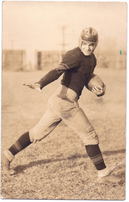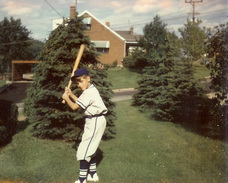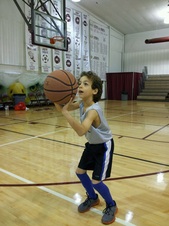
When I was in elementary and middle school, embellishing the unrealistic dream of someday becoming a professional athlete, my dad gave me basic pointers on how to play football and baseball—the two sports he excelled in as a young man. My memories of those times exist more as cloudy, nostalgic sentiments than detailed, visual images of specific exchanges. However, I do vividly recall his low-key approach to teaching me to play sports, both in his praise and criticism. In fact, my only meaningful memory of his frustration was when he told me one day that I would never amount to much as a ball player if I didn’t get rid of my sulky attitude. Even then, he didn’t raise his voice, he just shared his message in a stern, yet matter-of-fact manner.
I took his message to heart; this I know for sure. I am uncertain though whether part of the reason he expressed a laid back demeanor was because he believed I was eager to learn and trying my hardest. Did my energy make it easy for him to remain calm? I know I always wanted to please him.
Today, after a cycling training session with Phoenix, I was filled with my enduring sentiments of Dad, who passed more than 18 months ago. Phoenix got up on time at 6:20 a.m., but he soon started to get distracted and waste time while he ate breakfast and brushed his teeth. I became increasingly agitated because we faced serious time constraints in doing our planned workout before I dropped him off at camp by 8:30.
Beyond my frustration with his dawdling, I wasn’t sure what to expect from Phoenix on the bike because the night before he took part in a new triathlon training program. He logged cycling intervals on a stationary trainer and then ran a few miles with his new friends. That night, he seemed tired from the experience, but he often rebounds by the morning. When the morning came, I was hoping for the best.
I took his message to heart; this I know for sure. I am uncertain though whether part of the reason he expressed a laid back demeanor was because he believed I was eager to learn and trying my hardest. Did my energy make it easy for him to remain calm? I know I always wanted to please him.
Today, after a cycling training session with Phoenix, I was filled with my enduring sentiments of Dad, who passed more than 18 months ago. Phoenix got up on time at 6:20 a.m., but he soon started to get distracted and waste time while he ate breakfast and brushed his teeth. I became increasingly agitated because we faced serious time constraints in doing our planned workout before I dropped him off at camp by 8:30.
Beyond my frustration with his dawdling, I wasn’t sure what to expect from Phoenix on the bike because the night before he took part in a new triathlon training program. He logged cycling intervals on a stationary trainer and then ran a few miles with his new friends. That night, he seemed tired from the experience, but he often rebounds by the morning. When the morning came, I was hoping for the best.

But this morning, after watching how he warmed up and did a practice mount and acceleration, my optimism gave way to the realization that Phoenix wasn’t going to be committed to the session. He soon lagged behind on the ride, despite me being on my mountain bike. I called back to him “push yourself,” “come on, you’re not going to get on the podium going that slow, . . .” None of my verbal challenges dented his resistance; he was determined to go at a relatively leisurely pace.
Unlike my experiences with Dad, I sometimes question Phoenix’s lack of effort on the bike or when he is running, swimming, or playing one of his team sports. For the record, whatever significant experiences I had with Dad came later in my childhood because I wasn’t as deep into the athletic world when I was Phoenix’s age. I try to keep that difference in perspective, but I struggle with that at times.
What perplexes me is his situational willingness to sometimes exude a competitive, energetic spirit. When cycling, I’ve seen him celebrate those times when he is moving quickly next to me. What distinguishes those intense moments from his sluggish ones? I’m not always sure…fatigue from other activities, mood, drifting mind, or something else. I do know that he’s capable of meeting my expectations if he wants to because he has done so on various occasions.
Unlike my experiences with Dad, I sometimes question Phoenix’s lack of effort on the bike or when he is running, swimming, or playing one of his team sports. For the record, whatever significant experiences I had with Dad came later in my childhood because I wasn’t as deep into the athletic world when I was Phoenix’s age. I try to keep that difference in perspective, but I struggle with that at times.
What perplexes me is his situational willingness to sometimes exude a competitive, energetic spirit. When cycling, I’ve seen him celebrate those times when he is moving quickly next to me. What distinguishes those intense moments from his sluggish ones? I’m not always sure…fatigue from other activities, mood, drifting mind, or something else. I do know that he’s capable of meeting my expectations if he wants to because he has done so on various occasions.

How much of my observations are the result of developmental versus generational forces? That’s another tricky question. Those of us raised in an era and family context where kids were routinely discouraged from developing a sense of entitlement, tend to get annoyed with kids today who want the glory of an accomplishment without putting in the hard work and making sacrifices. Each successive generation of men and fathers seem to claim that their generation of peers was more mentally tough than their predecessor. I’m not aware of any rigorous data that either supports or refutes that claim, but anecdotally the idea resonates with me. Does it apply to elementary school kids? Perhaps, sometimes? However, the sporting opportunities for youth in the current era are so different in many ways, it distorts comparisons.
So, my ongoing dilemma is how hard can, or should I physically and mentally push Phoenix to do what it takes to achieve the goals he claims he wants to achieve? Of course, it takes little effort to express the desire “I want to be one of the best in the nation” at some athletic endeavor, but the journey to realize such a goal demands an incredible amount of focus, dedication, and hard work. That’s hard for most kids to grasp. Yet, some do. I regularly share my message about the value of hard work with Phoenix and I continue to push him beyond what he perceives to be his limits, then remind him later at those times when he’s focused, that what he just achieved was more than he had imagined. For now, my approach seems to be fostering more good than bad, so our journey continues day by day with a detailed written log to remind him just how much he has done and improved over months of training. He loves setting new personal records.
So, my ongoing dilemma is how hard can, or should I physically and mentally push Phoenix to do what it takes to achieve the goals he claims he wants to achieve? Of course, it takes little effort to express the desire “I want to be one of the best in the nation” at some athletic endeavor, but the journey to realize such a goal demands an incredible amount of focus, dedication, and hard work. That’s hard for most kids to grasp. Yet, some do. I regularly share my message about the value of hard work with Phoenix and I continue to push him beyond what he perceives to be his limits, then remind him later at those times when he’s focused, that what he just achieved was more than he had imagined. For now, my approach seems to be fostering more good than bad, so our journey continues day by day with a detailed written log to remind him just how much he has done and improved over months of training. He loves setting new personal records.

 RSS Feed
RSS Feed
